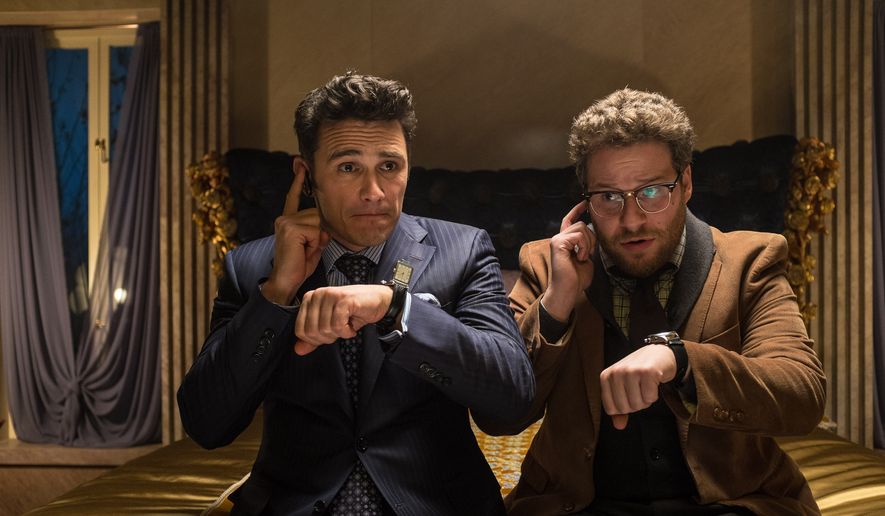Federal investigators have connected the Sony Pictures Entertainment Inc. hacking to North Korea, even as the studio on Wednesday canceled the movie’s scheduled Dec. 25 release amid a terrorist threat that prompted most of the top U.S. cinema chains to pull plans to show the film.
Instead, the studio will consider releasing the $42 million film, which centers on a CIA plot to assassinate North Korean leader Kim Jong-un, on premium video-on-demand, according to the industry newspaper Variety.
“We are deeply saddened at this brazen effort to suppress the distribution of a movie, and in the process do damage to our company, our employees, and the American public,” said a statement from Sony. “We stand by our filmmakers and their right to free expression and are extremely disappointed by this outcome.”
Despite initial skepticism in public, U.S. intelligence officials have become increasingly convinced North Korea may be behind the Sony hackers, who call themselves the Guardians Of Peace. North Korea has denied its involvement while praising the Sony hack as a “righteous deed.”
The Associated Press on Wednesday quoted a U.S. official as saying investigators had tied the incident to North Korea. Until Wednesday, the Obama administration had been saying it was not immediately clear who might have been responsible for the computer break-in.
An ABC report said the hack was routed through infected computers at various overseas locations, including Singapore, Thailand, Italy, Bolivia, Poland and Cyprus, and that the prime suspects are “members of an elite North Korean cybersecurity unit known as ’Bureau 121.’”
At the same time, Sony took a swipe at the hackers who leaked thousands of private company documents and emails over the past two weeks, embarrassing some top executives and prompting a lawsuit from several former employees.
“Those who attacked us stole our intellectual property, private emails, and sensitive and proprietary material, and sought to destroy our spirit and our morale — all apparently to thwart the release of a movie they did not like,” the Sony statement said.
The decision prompted former House Speaker Newt Gingrich to declare on Twitter that, “No one should kid themselves. With the Sony collapse America has lost its first cyberwar. This is a very, very dangerous precedent.”
Cineplex, the nation’s fifth-largest cinema chain, said in a statement Wednesday that it “takes seriously its commitment to the freedom of artistic expression, but we want to reassure our guests and staff that their security is our number one priority.”
The second-largest chain, AMC Entertainment, said the “confusion and uncertainty” created by the cancellation of both the movie’s New York premiere and publicity appearances by Mr. Franco and Mr. Rogen “brings into serious doubt whether the movie will open at all next week.”
“At this time, to best enable AMC guests to plan their holiday movie-going with certainty and confidence, AMC is programming its theatres without ’The Interview,’” said the statement.
And Regal Cinemas had pointed the finger back at the studio, saying it would delay “The Interview” “due to wavering support of the film … by Sony Pictures” as well as the possible threats.
A Tuesday message purportedly from the Guardians of Peace warned theaters that show the film would be hit with a 9/11-style terrorist attack, saying, “The world will be full of fear. Remember the 11th of September 2001.”
In Monday’s interview with ABC News, Mr. Rogen said he was surprised that the movie had become so controversial.
“Did you ever imagine you were going to stir up a storm like this?” a grinning Mr. Stephanopoulos said.
Mr. Rogen replied, “Um, no, I can’t definitively say I know the ramifications of the storm. I don’t know if the hacking honestly is because of our movie definitively or not. It is weird because we just wanted to make a really funny, entertaining movie. The movie itself is very silly, and it wasn’t meant to be controversial in any way.”
The Department of Homeland Security released a statement Tuesday casting doubt on the possibility of a terrorist attack at theaters that opt to show “The Interview,” saying “there is no credible intelligence to indicate an active plot against movie theaters within the United States.”
• Valerie Richardson can be reached at vrichardson@washingtontimes.com.




Please read our comment policy before commenting.